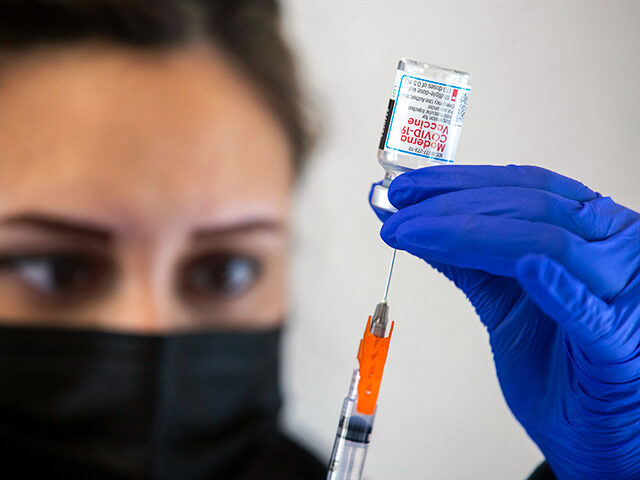The Biden administration will pay $176 million to Moderna to create an “mRNA-based pandemic influenza vaccine,” with health officials citing “lessons learned during the COVID-19 pandemic.”
The U.S. Department of Health and Human Services (HHS) made the announcement Tuesday, declaring that the expensive contract was made through the Biomedical Advanced Research and Development Authority’s (BARDA) new Rapid Response Partnership Vehicle (RRPV) Consortium.
The RRPV, managed by Advanced Technology International (ATI), is a 10-year, multi-purpose partnership designed to support advanced research and the development of medical tools, including vaccines.
While Moderna is already in the beginning stages of making a bird flu vaccine — which uses the same mRNA technology from previous coronavirus vaccinations — HHS officials said the new funds will aid the company “in ensuring the establishment of additional pandemic influenza vaccine response capability.”
“The U.S. government is committed to leveraging investments now to [ensure] cost parity for the American taxpayers in the future,” the press release noted.
“We have successfully taken lessons learned during the COVID-19 pandemic and used them to better prepare for future public health crises. As part of that, we continue to develop new vaccines and other tools to help address influenza and bolster our pandemic response capabilities,” said HHS Secretary Xavier Becerra, who President Joe Biden nominated soon after he took office in 2021.
“Importantly, we are doing this work in partnership with some of the nation’s leading scientists and clinicians. The Biden-Harris Administration won’t stop until we have everything we need to prepare for pandemics and other public health emergencies that impact the American public,” Becerra added.
The health department noted that the funds will include options for a large-scale pandemic response, as well as the option to pivot quickly if needed to “address other threats, such as emerging infectious diseases.”
“The award made today is part of our longstanding commitment to strengthen our preparedness for pandemic influenza,” said Dawn O’Connell, assistant secretary of HHS’s Preparedness and Response program.
“Adding this technology to our pandemic flu toolkit enhances our ability to be nimble and quick against the circulating strains and their potential variants,” she added.
Back in June, former director of the Centers for Disease Control and Prevention (CDC), Dr. Robert Redfield, said “it’s not a question of if, it’s more of a question of when” a bird flu pandemic will occur with “significant mortality” in humans.
Redfield, a virologist who was appointed to lead the CDC in 2018 by former President Donald Trump, gave his grave prediction during an appearance on NewsNation:
Bird flu, also known as avian flu or the H5N1 virus, has “probably somewhere between 25 and 50 percent mortality” in humans, the doctor warned.
“Unfortunately, bird flu, when it does enter humans, has a significant mortality. Probably somewhere between 25-50 percent mortality so it’s going to get quite complicated,” he explained.
The push for influenza vaccine options has come as the bird flu makes a jump from avian species to mammals, and even some human farm workers who have come into contact with infected animals.
The first human confirmed to have died from the virus was a 59-year-old Mexican man who contracted it in April, the World Health Organization (WHO) said.
However, relatives of the man said that he had “no history of exposure to poultry or other animals,” WHO noted.

COMMENTS
Please let us know if you're having issues with commenting.